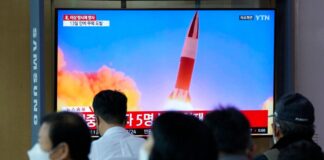
Israel assassinated Hamas’ top leader Ismail Haniyeh in Iran last summer, Defence Minister Israel Katz confirmed.
The comments by Katz appeared to mark the first time that Israel has acknowledged killing Haniyeh, who died in an explosion in Tehran in July. Israel was widely believed to be behind the blast, but its leaders only hinted at its involvement.
In a speech Monday, Katz also noted that Israel has killed other leaders of Hamas and Hezbollah, helped topple Syria’s Bashar al-Assad and destroyed Iran’s anti-aircraft systems. Now, Israel was focusing on Yemen’s Houthi rebels, according to the defence minister.
“We will strike (the Houthis’) strategic infrastructure and cut off the head of the leadership,” he said.
“Just like we did to Haniyeh, (Yahya) Sinwar and (Hassan) Nasrallah in Tehran, Gaza and Lebanon, we will do in Hodeida and Sanaa,” he said, referring to Hamas and Hezbollah leaders killed in previous Israeli attacks.
Who was Ismail Haniyeh?
Haniyeh, 62, was the leader of Hamas’s political wing and a prominent face of the organisation for decades.
Back in July, observers said Haniyeh’s death had dealt a significant blow to Hamas at a time when tensions were flaring in the Middle East over the devastating war in Gaza and raised questions about the future of negotiations between the militant group and Israel.
In recent years, Haniyeh ran the group’s political office from exile in Qatar, but his career stretches back decades.
Born on 29 January 1963 in the al-Shati refugee camp in the Gaza Strip, Haniyeh began his political career by closely aligning himself with Hamas founder Sheikh Ahmed Yassin, joining the paramilitary group during the First Intifada in the late 1980s.
Nicknamed Abu al-Abd, he was appointed as a member of the secretive “collective leadership” team in 2004 after Sheik Ahmed Yassin and Abdel Aziz Rantisi — Hamas’ two previous leaders — were killed by Israel.

In the wake of the 7 October attack on Israel’s territory, in which Hamas fighters killed at least 1,200 people and took more than 200 people hostage, Haniyeh became a key figure in negotiations to end the ensuing war in the Gaza Strip.
However, Israeli officials have several times held him responsible for the failure of peace talks and blamed him for refusing to release the hostages still alive in captivity in Gaza.
- Thousands attend funeral for assassinated Hamas leader Ismail Haniyeh
- EU calls for ‘maximum restraint’ after Hamas leader Ismail Haniyeh’s assassination
Despite holding a leadership position, Haniyeh faced his share of criticism from within Hamas on more than one occasion since the start of the war.
There were reports of disagreements between him and Sinwar, the military leader of Hamas inside Gaza killed by Israel in October, over both the approach to the ceasefire negotiations and military strategy.
In April, Israeli police arrested one of Haniyeh’s sisters on suspicion of having ties to members of the movement. A short time later, three of his sons and four of his grandchildren were killed in Israeli airstrikes.





